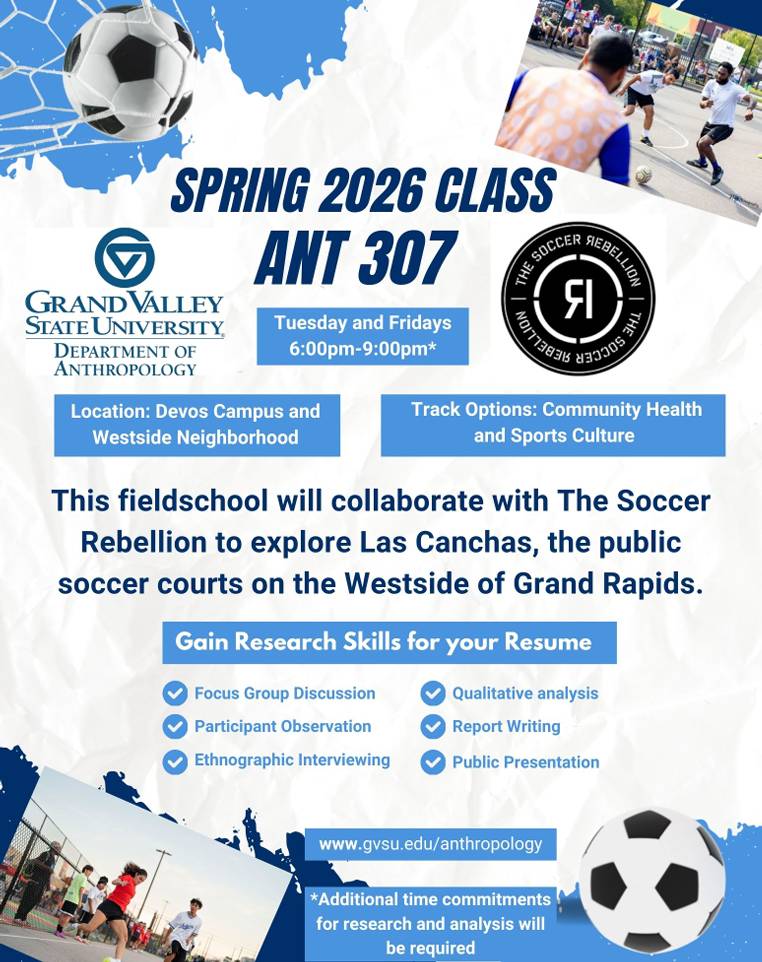GVSU Archaeology and Ethnography Field Schools

Sport and Community Health on the Westside of Grand Rapids
ANT 307: Field Techniques and Laboratory Methods in Anthropology
Ethnographic Field School
Dates May 11 – June 24, 2026
Times Tuesdays & Fridays 6-9 PM*
The Anthropology Summer Field School 2026 immerses students in daily life on the Westside of Grand Rapids. Students will engage in hands on research related to sports and community health. The field school will include the following interrelated and overlapping components:
• Classroom, focused on ethics and methods training, data analysis, report writing, and digital storytelling
• Fieldwork, including participant observation, focus groups, and semi structured and informal interviews
During the six-week field school, students will partner with The Soccer Rebellion and Las Canchas to gain an in-depth understanding of the needs, assets, motivations, and meanings related to sports and community health among those living and playing on the Westside. *Additional time commitments for research and analysis will be required
Banner Registration Information:
ANT 307-101, 3 credits CRN#40182 – Tara Hefferan (Sports Culture)
ANT 307-102, 3 credits CRN#42777 – Kristin Hedges (Community Health)
For more information, contact Dr. Tara Hefferan [email protected]; 616-331-8924 or Dr. Kristin Hedges [email protected]; 616-331-8212
50 Years of Archaeology
Past Field Schools
|
2018-2024 Field Schools |
Description |
|---|---|
|
Students participated in equity focused research through the Rapid Ethnographic Assessment (REA) method working with local organization(s) and their communities. Data was collected to help in problem solving emerging needs and associated policy decisions. REA act to decolonize anthropology, shifting power dynamics into the hands of the community/stakeholders. Practical skills employed in data collection may include digital study, narrative mapping, intercept survey, participant observation, active listening, and in-depth interview. Students will transcribe interviews, participate in field work debriefings, analysis (coding), and report writing. REA is a team-based form of research where students will be involved in all aspects from data collection to report writing. As this is a field course, 150 hours are required to fulfill the course requirements. (Appropriate IRB approval will be obtained prior to the start of research activities.) |
|
|
Campus Archaeology: Blendon Landing |
|
|
Anthropologists have studied festivals since the discipline's very early days, from Mardi Gras and Carnaval to Holi, el Día de los Muertos, Burning Man and Coachella. The 2022 field school researched a festival that has been an essential part of the Grand Rapids community for over 50 years, the Festival of the Arts. The Festival of the Arts is held downtown in early June each year and combines visual arts, live music, literature and multicultural food booths in an annual event that the Library of Congress has recognized as the largest all-volunteer arts festival in the United States. Students conducted ethnographic fieldwork, including surveys, focus groups, interviews and participant-observation, to enhance Festival organizers' own understandings of the makeup and motivations of the volunteers who make Festival happen. |
|
|
2021 Archaeological Field School |
The 2021 Archaeological Field School explored the history of the Eastmanville Farms Park. Now an Ottawa County Park, this property was once home to the Ottawa County Poor Farm. The Poor Farm was established in 1866 with the goal of providing needy residents a home while they aided in working the land. The farm provided social services to residents in various capacities until 2000. If you have any questions please email Gwyn Madden ([email protected]) or Heather Van Wormer ([email protected]) |
|
The Anthropology summer ethnographic field school 2019 explored patterns of substance use among GVSU students. The field school was designed to provide training in the application of research methods. Students learned participant observation, ethnographic survey, open-ended interviews, social mapping, and focus group discussion. The final product of the field school, a working paper with recommendation for administration, was submitted to the ACES program to understand and improve services for students. Instructor: Dr. Kristin Hedges ([email protected]) |
|
|
West Michigan Archaeological Field School Dates: First 6 weeks Spring term May 7-June 19 |
|
|
Borshchiv, Ukraine — The study abroad program in Ukraine is designed to educate students about the relationship between the environment and human beings. The courses will focus on how human activity has been shaped by the environment, as well as how humans have re-shaped the environment. Ukraine is a place where human and environmental interaction has experienced dramatic change several times throughout history, from the first farmers in the region to the 1986 tragedy at the Chernobyl nuclear power station. Courses in the program will highlight the crucial parameters of our interaction with nature, which shape both our biological and social development. The “Culture and Environment” course (part of the Man and Environment theme requirement) will be devoted to the study of human impacts, variability of experience in different environments, and environmental determinants of human cultures. Dates: June 30th-August 3rd |
